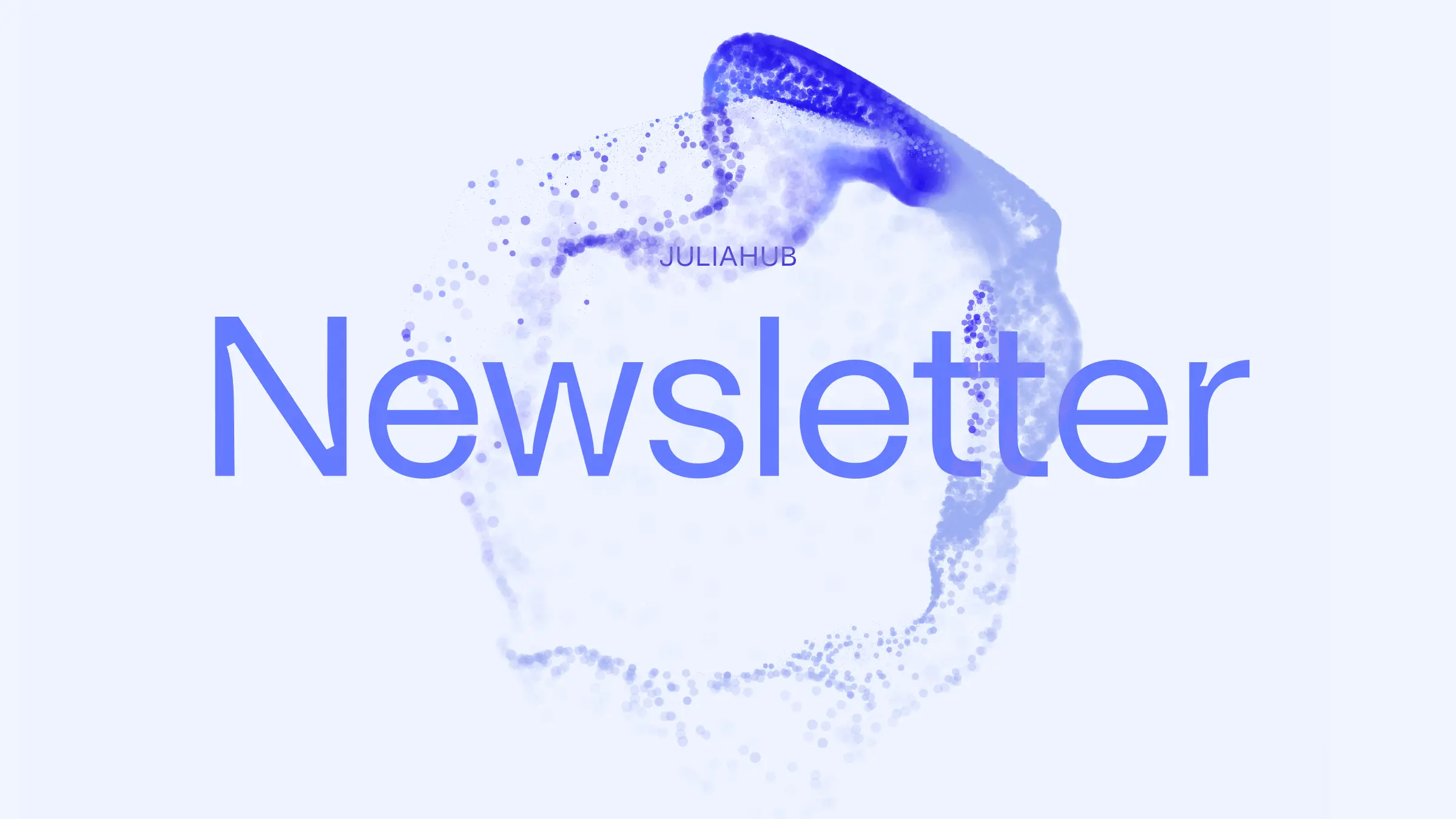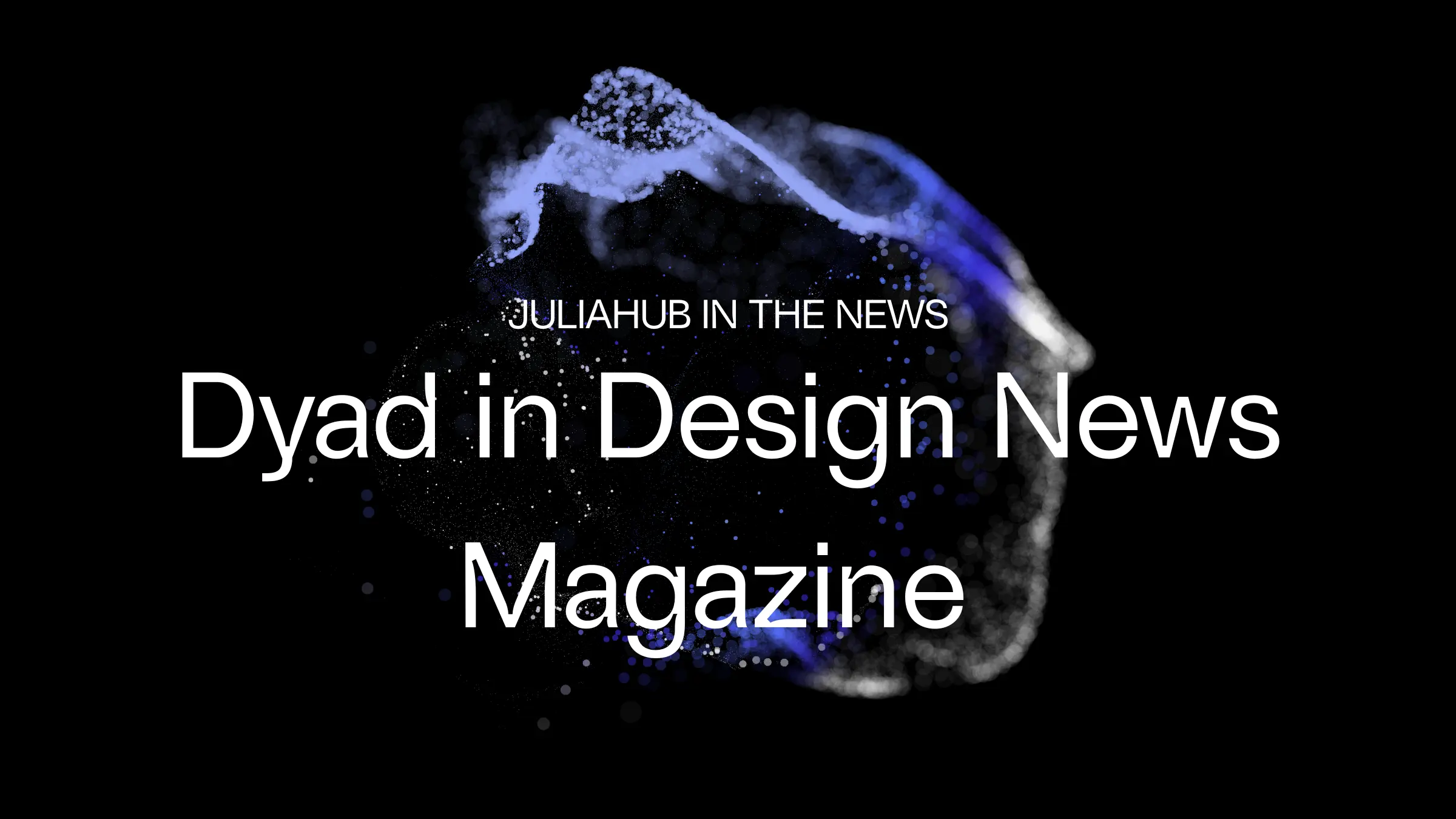Julia 2023 User & Developer Survey:
The fifth annual Julia User & Developer Survey is open now! Please click here to complete the survey. This year’s survey is now available in English, Spanish, Chinese (Simplified and Traditional), Japanese and Korean. Survey results will be presented during JuliaCon in July.
Pluto Notebooks Competition - Cash Prizes:
JuliaHub is hosting a competition to highlight the best examples of Pluto notebooks being used in industry. Click here for more information and to submit. The submission deadline is August 1. Notebooks will be judged based on 3 criteria:
Subject Matter: Does it solve an interesting problem?
Presentation: How interactive is it and what kind of output visualization does it include?
Package Usage: How well does it use Julia package(s) / JuliaHub?
Notebooks that discuss an interesting problem and how it was solved are preferred, as opposed to purely instructional notebooks.
The prizes are:
1st Prize winner gets: $500 Cash + $500 Hours worth of free compute on JuliaHub
2nd Prize winner gets: $300 Cash + $300 Hours worth of free compute on JuliaHub
3rd Prize winner gets: $150 Cash + $150 Hours worth of free compute on JuliaHub
Free Compute on JuliaHub (20 hours):
In addition to the features JuliaHub has always offered for free—Julia ecosystem search, package registration tools, a dedicated package server—the platform now also gives every user 20 hours of free compute. This allows people to seamlessly share Pluto notebooks and IDE projects with others and let them get their feet wet with computing without having to open up their wallets. Click here to get started or check out Deep Datta’s introductory video, “JuliaHub Is a Free Platform to Start Your Technical Computing Journey”, where he explains how and why to start using JuliaHub for cloud computing.
Free Webinar from JuliaHub:
Breaking Boundaries in Data Science: Introducing Next-Generation Analysis and Visualization is a free one-hour Webinar hosted by JuliaHub’s Deep Datta and Phil Vernes. This Webinar takes place Wednesday, July 12 at 1 pm Eastern (US). Click here to register. Participants will explore the capabilities of Pluto notebooks and Plotly to visualize and uncover valuable insights, and learn how to build interactive and user-friendly Web applications to turn data into visualizations, including:
How to import CSV data into a Julia Dataframe in JuliaHub
Evaluating datasets using Pluto and Plotly
Building an app using a Dash/Genie framework
Enabling efficient data processing and analysis
JuliaCon 2023:
Tickets are still available for JuliaCon 2023! Click here to register. JuliaCon will be held in person for the first time since 2019, and will be held at MIT for the first time since 2016. JuliaCon will take place July 25-29. JuMP-dev and SciMLCon will both take place during JuliaCon this year.
Keynote Speakers: Dr. Christopher Rackauckas, Dr. Stephen Wolfram, Dr. Rumman Chowdhury, Dr. Tim Davis
Sponsorship: Sponsorship is available at many levels, from $1,000 for an exhibition table to $45,000 for Diamond sponsorship. Current and recent sponsors include: JuliaHub, ASML, Pumas-AI, QuEra Computing, RelationalAI, Jolin.io, NumFOCUS, Julius Technologies, Intel, AWS, Invenia Labs, Google, EVN, DataChef, Gordon and Betty Moore Foundation, Tangent Works, Replit, Capital One, Nvidia, Microsoft, Alan Turing Institute, Zapata, Beacon Biosignals, Metalenz, G-Research, Conning, Jeffrey Sarnoff and more.
Julia Community Prize: Is there someone who you would like to see recognized for their contributions to the Julia language and/or community? Nominations are open now. Please note that past winners are not eligible.
How to Tune a Kalman Filter:
Dr. Fredrik Bagge Carlson (JuliaHub Control Systems Team Lead) has published a new blog post, How to Tune a Kalman Filter. “The celebrated Kalman filter finds applications in many fields of engineering and economics. While many are familiar with the basic concepts of the Kalman filter, almost equally many find the "tuning parameters" associated with a Kalman filter non-intuitive and difficult to choose.” Click here for more.
Summary of Julia Plotting Packages:
Dr. Chris Rackauckas (JuliaHub Director of Modeling and Simulation) has published a new blog post, Summary of Julia Plotting Packages. Chris reviews Plots, Makie, AlgebraOfGraphics, Gadfly, Vega, VegaLite, Plotly, PlotlyLight,GR, PGFPlotsX, UnicodePlots, Gaston, GMT and GNUPlot.
Julia for Materials Science:
A new paper in Nature - Scientific Reports uses Julia to model material properties. Click here to read A Generalized Deep Learning-Based Surrogate Model for Homogenization Utilizing Material Property Encoding and Physics-Based Bounds.
Julia for Cryptography:
HUBO and QUBO Models for Prime Factorization is a new paper in Nature - Scientific Reports using Toq.jl for d-wave machines. Click here for more information.
Julia for High Energy Physics Computing:
Potential of the Julia Programming Language for High Energy Physics Computing describes how Julia solves the two-language problem for high energy physics computing. “A more convenient and efficient approach would be to use a language that provides both high-level programming and high-performance. The Julia programming language, developed at MIT especially to allow the use of a single language in research activities, has followed this path. In this paper the applicability of using the Julia language for HEP research is explored, covering the different aspects that are important for HEP code development: runtime performance, handling of large projects, interface with legacy code, distributed computing, training, and ease of programming. The study shows that the HEP community would benefit from a large scale adoption of this programming language.”
Julia for Point Process Modeling and Simulation:
Extending JumpProcess.jl for Fast Point Process Simulation with Time-Varying Intensities is a new article co-authored by Dr. Chris Rackauckas (JuliaHub Director of Modeling and Simulation). The authors “extended JumpProcesses.jl with a new simulation algorithm, Coevolve, that enables the rapid simulation of processes with locally-bounded variable intensity rates. It is now possible to efficiently simulate any point process on the real line with a non-negative, left-continuous, history-adapted and locally bounded intensity rate coupled or not with differential equations. This extension significantly improves the computational performance of JumpProcesses.jl when simulating such processes, enabling it to become one of the few readily available, fast, general-purpose libraries for simulating evolutionary point processes.”
Julia for Markov Chain Monte Carlo Simulation:
Differentiating Metropolis-Hastings to Optimize Intractable Densities is a new article co-authored by Dr. Chris Rackauckas (JuliaHub Director of Modeling and Simulation). The authors “develop a methodology for unbiased differentiation of the Metropolis-Hastings sampler, allowing us to differentiate through probabilistic inference.”
Converting from Proprietary Software to Julia:
Are you looking to leverage Julia’s superior speed and ease of use, but limited due to legacy software and code? JuliaHub and our partners can help accelerate replacing your existing proprietary applications, improve performance, reduce development time, augment or replace existing systems and provide an extended trusted team to deliver Julia solutions. Leverage experienced resources from JuliaHub and our partners to get your team up and running quickly. For more information, please contact us.
Careers at JuliaHub:
JuliaHub is a fast-growing tech company with fully remote employees in 12 countries on 5 continents. Click here to learn more about exciting careers and internships with JuliaHub.
Julia and JuliaHub in the News
Boston Business Journal: Form D Friday
Mozilla: Advancing the Future of the Internet by Making Math More Inclusive
Data Driven Investor: Can I Use Jupyter Notebooks with Languages Other than Python?
Armenpress: Scientific Computing with Julia Language
Geeky Gadgets: Learn How to Code Using OpenAI Playground
ReadWrite: Best Developer Tools of 2023
The Sentinel: Memorandum of Understanding Signed Between Cotton University and NIELIT
TechBullion: Generative AI: A Comprehensive Tech Stack Breakdown
Linux Shout: 6 Best Python IDEs Available for Ubuntu Linux for Coding
Analytics Insight: Python vs. Julia: Which Language Is Faster?
Astrobites: Notebooks For All: Making Jupyter Notebooks More Accessible
Analytics Insight: How to Become a Certified Data Scientist? A Simplified Guide
Gearrice: Mojo Is a New Programming Language for Developing Artificial Intelligence. Some People Believe That It Can Be the Successor to Python
Lancet: The Current Landscape of Software Tools for the Climate-Sensitive Infectious Disease Modeling Community
Nature - Scientific Reports: A Generalized Deep Learning-Based Surrogate Model for Homogenization Utilizing Material Property Encoding and Physics-Based Bounds
KDnuggets: 5 Free Julia Books For Data Science
Prag News: MoU Signed Between Cotton University and NIELIT Guwahati
IT for Business: Devoteam Places its TechRadar 2023 Under the Sign of “Cloud Native”
Nature - Scientific Reports: HUBO and QUBO Models for Prime Factorization
Julia Blog Posts
Summary of Julia Plotting Packages (Chris Rackauckas)
How to Tune a Kalman Filter (Fredrik Bagge Carlson)
How to Read Error Messages in Julia (Ifihanagbara Olusheye)
Importing Genie Builder Apps for Deployment on Genie Cloud (Pere Giménez)
Reflecting on Macros (Jonathan Carroll)
Homographs in DataFrames.jl (Bogumił Kamiński)
Refreshing Mining Complex Networks Book (Bogumił Kamiński)
Filtering Grouped Data Frames in DataFrames.jl (Bogumił Kamiński)
Lessons Learned from WAW2023 Conference (Bogumił Kamiński)
Software Testing for Scientists (Matthijs Cox)
Scientific Software Institutes (Matthijs Cox)
Introducing: Olive REPL Cells (Emma Boudreau)
More Good News And Olive Stuff (Emma Boudreau)
A Beginner-Friendly Introduction to Applied Science (Emma Boudreau)
10 Julia Base Methods For Introspection Maniacs! (Emma Boudreau)
Olive 0.0.9 Diaries (Emma Boudreau)
Selling Art on the Beach (Abel Soares Siqueira)
Upcoming Julia and JuliaHub Events
San Francisco, CA: Design Automation Conference with JuliaHub July 9-13
Online: Breaking Boundaries in Data Science: Introducing Next-Generation Analysis and Visualization with Deep Datta (JuliaHub Product Director) and Phil Vernes (JuliaHub Sales Engineer) July 12
Cambridge, MA: JuliaCon 2023 with JuliaHub July 24-29
Aachen: Modelica Conference with JuliaHub October 9-11
Washington, DC: American Conference on Pharmacometrics with JuliaHub November 5-8
Recent Julia and JuliaHub Events
Montréal: Optimization Days at HEC Montréal with Canadian Operational Research Society (CORS) and Centre Interuniversitaire de Recherche sur les Reseaux d'Entreprise, la Logistique et le Transport (CIRRELT) May 29-31
San Diego: American Control Conference with JuliaHub May 31-June 2
Trondheim: Bridging Frontiers in Scientific Computing, Machine Learning and Systems Engineering with Julia at Norwegian University of Science and Technology (NTNU) with Dr. Chris Rackauckas (JuliaHub Director of Modeling and Simulation), Dr. Fredrik Bagge Carlson (JuliaHub Team Lead, Dyad Control) and Dr. Avinash Subramanian (JuliaHub Control Engineer) June 7
Online: Calibrating Models to Difficult and Noisy Data with Dyad Model Optimizer with Dr. Ranjan Anantharaman (JuliaHub Sales Engineer) June 14
London: Using Large Language Models in Julia with Avik Sengupta (JuliaHub VP of Engineering) at ODSC Europe June 14-15
Paris: Paris Air Show with Dr. Viral Shah (JuliaHub CEO, Co-Founder and Julia Co-Creator) June 19-25
Contact Us:
Please contact us if you want to:
Learn more about JuliaHub, Dyad (Formerly JuliaSim), Pumas, PumasQSP or CedarEDA
Obtain pricing for Julia consulting projects for your organization
Schedule Julia training for your organization
Share information about exciting new Julia case studies or use cases
Spread the word about an upcoming online or offline event involving Julia
Partner with JuliaHub to organize a Julia event online or offline
Submit a Julia internship, fellowship or job posting
About JuliaHub and Julia
JuliaHub is a fast and easy-to-use code-to-cloud platform that accelerates the development and deployment of Julia programs. JuliaHub users include some of the most innovative companies in a range of industries including pharmaceuticals, automotive, energy, manufacturing, and semiconductor design and manufacture.
Julia is a high performance open source programming language that powers computationally demanding applications in modeling and simulation, drug development, design of multi-physical systems, electronic design automation, big data analytics, scientific machine learning and artificial intelligence. Julia solves the two language problem by combining the ease of use of Python and R with the speed of C++. Julia provides parallel computing capabilities out of the box and unlimited scalability with minimal effort. Julia has been downloaded by users at more than 10,000 companies and is used at more than 1,500 universities. Julia co-creators are the winners of the prestigious James H. Wilkinson Prize for Numerical Software and the Sidney Fernbach Award.






